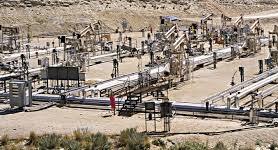Widgetized Section
Go to Admin » Appearance » Widgets » and move Gabfire Widget: Social into that MastheadOverlay zone
‘Never-ending oil shale science project’ may finally be ending
In high-alpine, arid places like Colorado, the least amount of water and energy you can consume to produce more energy the better, one would think. But for a century speculators have been intrigued – some would say obsessed – with unlocking the organic kerogen trapped in rocks on the state’s Western Slope and converting it into oil.
Back when I had a regular job covering energy and environmental issues for the Colorado Independent, I wrote extensively about the seemingly endless quest to make oil shale production commercially viable. Opponents called it a “never-ending science project,” while proponents touted it as the key to energy independence in an increasingly unstable world.
Garfield County Commissioner John Martin later told me we should seriously consider nuclear power, which requires an enormous amount of water for cooling, to provide enough electricity for the state’s still-unproven oil shale industry.
Martin is the same guy who, when he was a cop in the days after Black Sunday, May 2, 1982, served eviction notices to home and business owners shattered by the pullout of Exxon from its Colony Oil Shale Project – a move that cost 2,200 people their jobs. Those layoffs included one of my high school teachers in Denver, who quit to move to Parachute during the height of the boom. She had to move back to Denver a few months later when it all went bust.
Coloradans have long been divided on the promise of oil shale.
“In the last six years U.S. natural gas production has increased 20 percent,” the late Randy Udall told me in 2011. “In North Dakota, the Bakken Formation is yielding 300,000 more barrels of oil today than it did five years ago. The oil and gas industry is very good at unlocking difficult oil and gas petroleum resources. But oil shale continues to be a laggard. It continues to be a no-show, and one must really wonder whether oil shale is ever likely to be a significant player in U.S. energy supplies.”
On the other side of the coin, oil shale expert Dr. Jeremy Boak at the Colorado School of Mines likened the Obama administration’s “go-slow” approach to oil shale to the Bush administration’s foot-dragging on climate change.
“It’s curious to hear the same sort of arguments being made by this administration that were made by the Bush administration for not doing anything on climate change,” Boak told me in 2011. “We’ve got to have all the answers before we can move.”
Now comes the recent news that, like Chevron in 2012, Shell is pulling out of its research and development leases in Colorado. An oil shale proponent told the Glenwood Springs Post Independent he thought the big oil companies would be able to solve the puzzle but now it’s likely up to the small entrepreneurs (over the course of the next century, I presume).
By then, fossil fuel consumption will hopefully be waning and we’ll never have to smash up or superheat all of those rocks in Northwest Colorado where we all like to hike, bike, hunt and fish.



